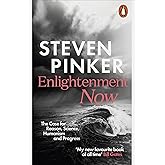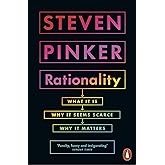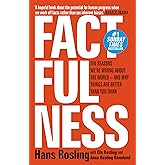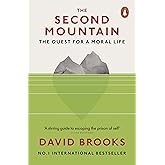
Download the free Kindle app and start reading Kindle books instantly on your smartphone, tablet or computer—no Kindle device required.
Read instantly on your browser with Kindle for Web.
Using your mobile phone camera, scan the code below and download the Kindle app.

The Better Angels of Our Nature Paperback – 1 January 2011
Purchase options and add-ons
- LanguageEnglish
- PublisherPenguin Us
- Publication date1 January 2011
- ISBN-100670023159
- ISBN-13978-0670023158
Customers who viewed this item also viewed
Product details
- Publisher : Penguin Us (1 January 2011)
- Language : English
- ISBN-10 : 0670023159
- ISBN-13 : 978-0670023158
- Customer Reviews:
About the author

Steven Pinker is one of the world's leading authorities on language and the mind. His popular and highly praised books include The Stuff of Thought, The Blank Slate, Words and Rules, How the Mind Works, and The Language Instinct. The recipient of several major awards for his teaching, books, and scientific research, Pinker is Harvard College Professor and Johnstone Family Professor of Psychology at Harvard University. He also writes frequently for The New York Times, Time, The New Republic, and other magazines.
Customer reviews
Top reviews from Australia
There was a problem filtering reviews. Please reload the page.
- Reviewed in Australia on 22 December 2024Verified PurchaseA very thought provoking and extremely well researched book. I'd love to know if the author's opinions have altered at all with the dramatic changes in world affairs since this book was published.
- Reviewed in Australia on 7 December 2019Verified PurchaseA must-read and it puts its point across in very simple terms. The point is the world is no as sad or bad as expected
- Reviewed in Australia on 19 May 2020Verified PurchaseI have a reasonable vocabulary (I thought) but there's so many words I don't know in this book. Enervating, invidious, perquisite, irenic, tendentious, abjuring, obloquy, colloquy, ectomorph, calumny, ambuscade, enjoin ... the list goes on and on.
It's very impressive that Mr Pinker knows so many words, but he seems to not understand that using them all is not the best way to communicate a message.
So, while I'm enjoying expanding my vocabulary, I think the book would be better if it dialled back the arcane language and allowed readers to become immersed in the message of the book, which is an excellent one.
- Reviewed in Australia on 13 August 2020Verified PurchaseLove it
Everyone should read this book
- Reviewed in Australia on 1 May 2015Verified PurchaseAgree or disagree, it makes you think!
- Reviewed in Australia on 8 October 2017This is a fantastically-written book, explaining in very simple terms why the common belief (that crops up in every generation) that the world is always getting worse is misguided. Of course, there are ups and downs, and Pinker does not ignore those, but it all comes out in the wash. An important book and highly recommended, especially if you don't currently agree with the premise.
- Reviewed in Australia on 25 July 2014Loved every reasoning, a reminder of the horrific deeds us humans have been and to some extent still are willing to impose on each other yet the book also lightens up the hope that the better part of our inner self prevails thus securing the better future for our children.
- Reviewed in Australia on 23 September 2014Verified PurchaseSadly the author is woefully ignorant of the accepted academic position by Christian and non-Christian scholars on the history of Jesus Christ and Christianity. He offers a cursory glance on Christianity, mocking it as he goes.
If he was able to offer an argument as to why his position should be considered, then OK.
This dribble is not worth reading.
Top reviews from other countries
 Gregory J. CasteelReviewed in the United States on 9 October 2012
Gregory J. CasteelReviewed in the United States on 9 October 20125.0 out of 5 stars The most important book written in a very long time
Verified PurchaseOne of these days I'm going to sit down and make a list of the Top 100 nonfiction books that everyone absolutely must read if they really want to understand the world we live in. And, when I do, this book by the noted experimental psychologist and cognitive scientist Steven Pinker will definitely make the Top Ten. In fact, I'm even tempted to say that this might very well be the most important book of the 21st century thus far.
Okay, I'll admit that I might be just a little bit biased in this assessment, because this book deals, in large part, with my two main areas of study as a political scientist: international relations, with a focus on war and international security, and comparative politics, with a focus on political development and modernization. In fact, this book bridges these two topics by showing how modernization has helped make the world more peaceful. (And if you don't believe that the world is a lot more peaceful today than it was at any time in the past, you really do need to read this book.) When I was in grad school (where I studied under John A. Vasquez and James Lee Ray, two of the world's leading experts on war and peace, both of whom are cited in Pinker's book) my main focus was on the scientific study of international militarized conflict, using quantitative methods such as statistical analysis and game theory in order to better understand why nations go to war and what it takes to maintain the peace. This particular subfield of international relations (which is sometimes referred to as "peace science") aims to identify historical patterns and trends in international conflict, to find variables that correlate well with war (or with peace), to assess the probability that an international crisis will escalate to the use of military force, and to evaluate foreign policy alternatives to see which are more likely to provoke war and which are more likely to promote peace. Although peace science is usually viewed as a subfield of international relations (which is itself a subfield of political science), it is really an interdisciplinary field that draws on a number of different academic disciplines, from political science, to sociology, to psychology, to econometrics, to mathematics, to systems engineering and beyond (in fact, the generally recognized "founder" of the field, Lewis Fry Richardson, was a physicist, mathematician, meteorologist, and psychologist). And peace scientists no longer limit themselves to studying international conflict alone, but are now applying their methods to the study of civil wars, ethnic conflict, terrorism, and other forms of politically-motivated or "group-on-group" violence. Over the past few decades, peace science has discovered a number of things about what leads to war and what keeps the peace. Unfortunately, the general public is largely unaware of these discoveries because they haven't been well publicized -- at least not until now. In this book, Steven Pinker tries to bring some of the key findings of peace science research to the public's attention.
Although a number of excellent scholarly works have been written by researchers in the field of peace science, most of these are aimed specifically at an academic audience that is accustomed to reading and interpreting quantitative research. These texts tend to be highly technical and rather dry; and most of them presume that the reader already has a strong background in the fundamentals of the subject. So they are unlikely to be of much interest to lay readers. And even the few books on the subject that are written so as to be reasonably accessible to non-specialists still tend to be written in the academic style of the scholar, rather than the more relaxed style of the popular writer; so they're unlikely to find their way to the top of any bestseller list. But this book is different. It was written specifically for a general audience rather than for professors and grad students; so it tries to keep the tone light and informal, avoiding the arcane language of statistics in favor of simple descriptions and visual illustrations. You don't need to know what a "chi-square" or a "Pearson's r" is in order to understand the research findings summarized in this book. All you need is university-level English literacy and the ability to follow a trend line on a graph. That's one reason why, if I had to recommend just one book for anyone interested in finding out the most important lessons we've learned from the scientific study of war and peace, this is the book I'd have to recommend -- not because it's the best, or the most comprehensive, or the most in-depth; but because it's the most accessible. (Of course, I intend this as no slight to any of my colleagues and former professors who have written their own books on the subject -- in particular my dissertation advisor, John A. Vasquez, whose seminal work, "The War Puzzle", which has recently been revised and updated as "The War Puzzle Revisited", is one of the best books ever written on the causes of war, and is worth reading even if you have no background in international relations. Yet, I still feel that Pinker's book is more accessible to lay readers.)
You might find it a bit strange that I would recommend a book by Steven Pinker as your introduction to peace science. After all, Pinker is not generally recognized as a "peace scientist" in the strictest sense of the term -- i.e. he has not devoted his career to studying the causes of war. Rather, he is a world-famous experimental psychologist and cognitive scientist who is best known for his work on how the mind works and, especially, how it processes language. His previous books (which are well worth reading, by the way) have all focused on these subjects. This new book is Pinker's first foray into the field of peace science. But he does an excellent job of summarizing what peace science has discovered about war and peace in language that is clear and easy to understand; and he manages to put the findings of peace science into a larger context of what is known about violence in general -- a topic that is perhaps best explored by a psychologist such as Pinker. Perhaps more importantly, Pinker is an excellent writer who is able to present scientific findings to a general audience in a way that makes sense, but without in any way "dumbing down" the material. Unlike many other academic writers, Pinker's writing style is engaging and entertaining -- his tone is conversational rather than professorial -- and yet he is careful to give proper citations for every substantive point he makes (he includes 41 pages of end notes, and 33 pages of bibliography). I should also note that Pinker is very thorough in his analysis. This is a very lengthy tome, running for nearly 700 pages (not counting the front matter, end notes, bibliography, etc.). It may take you a while to read; but it's worth every minute; and, if you're anything like me, you'll actually enjoy it.
Since my background is in peace science, my review has thus far focused on what Pinker has to say about war. But that's just one part of what this book is about. This is really a book about violence -- all types of violence, both large scale and small -- and war is just organized violence on an extremely large scale. War is arguably the most important form of violence; but it's not the only form. As it is usually understood, "violence" can include anything from full-scale war, to limited military action, to genocide, to ethnic conflict, to government oppression and human rights abuses, to religious persecution, to slavery, to terrorism, to lynching and other hate crimes, to murder, to capital punishment, to torture, to rape, to spousal and child abuse, to assault, to dueling, to bullying, to animal cruelty, to the spanking of naughty children. Scholars who study international conflict tend to focus on the unique geopolitical factors that lead nations to send soldiers into battle -- factors that are not relevant to our understanding of violence committed on smaller scales. But might it be possible that the root causes of large scale violence are to be found in the very same pathologies of human nature and human culture that give rise to honor killings, witch hunts, blood sports, hazing rituals, and even bar fights? Pinker believes that it is; and he marshals a considerable body of evidence to support that view.
He argues that all acts of violence, regardless of their scale, begin with decisions made by individuals; and, like all decisions, the decision to use violence is the product of cognitive processes that take place in our brains. And understanding how these cognitive processes work is Steven Pinker's particular area of expertise. Based on this understanding, Pinker is able to show how our brains make the decision of whether or not to use violence, and what factors influence this decision. There are a number of factors that work to push us towards using violence, and a number of other factors that work to restrain us from using violence. Some of these factors are internal (or internalized), such as our natural instincts for self-preservation, our moral values, and our capacity for empathy, self-control, and rational thought. Other factors are external, such as the norms of the society we live in, the constraints imposed on our behavior by various social institutions, and the specific demands of the situation we happen to find ourselves in at any given time. A violent act is the end result of a complex cognitive process -- most of which takes place below the level of our conscious awareness -- which takes all of these internal and external factors into account. That's why violence is not a constant. Sometimes people are violent; sometimes they're not. An individual might use violence under certain circumstances but not under others. Some people are more prone to violence than are others. Some places experience more violence than do others. And some historical periods have been more violent than have others. Violence is variable. It waxes and wanes in response to various influences. Understanding these influences is the key to understanding violence of all kinds, and how to bring it under control.
Violence will always be a part of the human experience; but it need not be its defining feature. We'll never completely eliminate violence from our world -- there will always be occasional muggings, rapes, murders, human rights violations, acts of terrorism, and even wars -- but we can reduce these things to the point where people need not live in constant fear for their safety. And we've already made a lot of progress in this direction. Using a wealth of statistical evidence, Pinker shows that we are living in what is perhaps the least violent period in the history of the human race. All forms of violence -- everything from war, to genocide, to religious persecution, to murder, to rape, to capital punishment, to torture, to animal cruelty, to the spanking of children -- are at historically low levels; and most of them have been in a state of nearly constant decline for centuries (with a few temporary setbacks in the 20th century). This may be hard for many people to believe, since our popular culture and the 24-hour news media are constantly bombarding us with images of violence, and since most people have a rather poor grasp of history; but if you take an objective look at the level of violence we see in the world today compared to the level of violence our ancestors lived with in centuries past, it becomes quite clear that we are now living in a golden age of relative peace and security that our great great great great great grandparents could never have imagined.
What is the cause of this decline in violence? This is the main question that Pinker tries to answer in this book. I won't attempt to summarize his findings here -- it's better if you read Pinker's argument, and the evidence he presents in support of it, for yourself. But I will say that it has a lot to do with my second field of study: political development and modernization. The world is becoming less violent as it modernizes and becomes more politically developed. This also helps to explain why some parts of the world are much more violent than others, even today, since political development has not been uniform around the globe. The least developed countries tend to be the most violent, and the most developed tend to be the least violent. You might suspect that this is simply a matter of economics -- i.e. that violence is a byproduct of poverty, so richer countries would tend to be less violent than poorer countries -- but it's actually a lot more complicated than that. (After all, the United States is a very rich country; but it's a lot more violent than Canada, Western Europe, and other parts of the First World.) So the real explanation has more to do with politics and culture than with economics. I'm not going to try to summarize in a few sentences what Pinker spent nearly 700 pages trying to explain -- you really do need to read the book for yourself -- but I will note that Pinker's theory is consistent with what we know about political development and modernization, and is certainly consistent with my own personal views on the subject. I think that Pinker's explanation for why violence has declined over time is essentially correct, and needs to be taken seriously.
If you want to understand the historical decline of violence you really must read Pinker's book. I would recommend it to almost anyone. However, I ought to point out that there are things in this book that some people may find disturbing or offensive. For one thing, in order to fully convince the reader that the world is much less violent today than at any time in the past, Pinker catalogues, in gruesome detail, forms of brutality that were quite commonplace at one time, but that are simply unimaginable today. He describes sadistic methods of torture and public execution that were once deemed perfectly just and proper, but that utterly shock the conscience of the modern reader. He discusses military tactics that were considered perfectly normal centuries ago, but that would be condemned as war crimes or acts of genocide today. He even talks about various acts of animal cruelty that our ancestors would have viewed as entirely unremarkable, such as the common pastime of torturing cats to death, which was a popular form of public entertainment in Medieval Europe. The book also includes very frank discussions of rape, domestic violence, and abuse, which may not be suitable for some readers, who may find some of this material disturbing, or perhaps even triggering. Some readers may even be offended by some of the things that Pinker has to say. He is not a fan of "political correctness", and refuses to censor himself or to sweep inconvenient truths under the rug simply to appease those who might not like what he has to say. He is willing to challenge the conventional wisdom if it is not supported by adequate evidence; and he even has the temerity to debunk some of the popular myths about violence that routinely get cited as "facts" in the media, in public discussions about violence, and even (sadly) in academic literature. Pinker's objective in this book is to set the facts straight, even if he has to ruffle a few feathers in the process. He has some harsh words for religion, which are bound to offend some believers. While he does not condemn religion wholesale in the manner of the so-called "New Atheists" like Richard Dawkins and the late Christopher Hitchens, he does strongly criticize the ancient moral codes that many of the world's major religions are built on. Pinker draws our attention to the many barbaric passages in the Hebrew Bible (Old Testament) that, for example, command God's "chosen people" to slaughter every man, woman, and child in the cities they conquer; that prescribe death by stoning as the appropriate punishment for all manner of petty offenses and unconventional sexual proclivities; and that even permit men to own slaves and to obtain wives and concubines by abducting and raping foreign women. Pinker is careful to point out that most modern Jews and Christians ignore these troublesome passages, and utterly reject them as guides to moral behavior in the modern world. He insists that his purpose in highlighting the flaws in the biblical conception of morality is not to cast aspersions on modern-day believers, but simply to illustrate how far we've come in our understanding of right and wrong -- particularly when it comes to the use of violence and how we treat other human beings -- since the Hebrew Bible was written. But he does call our attention to the dangers of trying to base one's morality on these ancient texts, which reflect pre-modern values that most people today -- including most contemporary Christians and Jews -- would find not only abhorrent, but ungodly. So, some believers will likely take offense at Pinker's comments, especially if they're not accustomed to viewing their faith traditions and their scriptures with a critical eye. But you can't please everyone; so it's better just to speak the truth as you see it, and not worry about who might take offense. That's what Pinker does; and I have to admire him for it.
Anyway, this is one of the best books I've read in years. I highly recommend it.
-
 らるぷReviewed in Japan on 12 November 2016
らるぷReviewed in Japan on 12 November 20165.0 out of 5 stars 読んで良かったと真に思う1冊
Verified Purchase”今”を生きる我々は、20世紀の二つの大戦を筆頭とする戦争、紛争、内乱、暴力の歴史、冷戦後の世界の新たな混迷を目の当たりにしてきて、つい「昔は良かった/良かったんじゃないか」的なノスタルジアや、「長い歴史の中で、人類は発展、進化すればするほど、破壊的、暴力的になってきている/なっていくんじゃないか」という悲観的な考えをどこか持っている。
しかし、ピンカーは、人類は、過去(昔)いかに暴力的であったか、しかも、それがいかに残酷、凄惨、身近なものであったか? そして、それが、長い年月/歴史の中で、長期的視点で、いかに”量的”、”質的”に劇的に減少/低下してきているか、なぜそうなってきたのか?を、豊富なデータとあらゆる角度からのアプローチで検証し説明しきっている。。。まさに大作である。
「なぜそうなってきたのか?」をしっかり認識することが、現代社会を形作っている我々一人一人にとって重要だと痛感させられた1冊。
総数約800頁、本編部分だけでも700頁に達っし、一部、自分に縁遠い分野の単語も出てくるので、読破するのに1ヶ月強と時間は要したが、文章は平易で、内容は興味深くカロリー満点であるため、飽きずに快読。
この本に限らずだが、英語原著で読むことを敬遠する人が多いかもしれないが、著者が訴えたいことを直接感じれる。少しでも、歴史、社会、政治等々に興味のある方には、是非おすすめしたい1冊である。
著者に感謝。
 Wallenius JaakkoReviewed in the United Kingdom on 9 November 2011
Wallenius JaakkoReviewed in the United Kingdom on 9 November 20115.0 out of 5 stars Has violence really declined dramatically?
Verified PurchaseOne just rarely meets a book that can fulfill all of your reading-needs at the same time. This book by Steven Pinker is one of them.
I love books that can give brand new insights even to the things that I already know. This book is choke full of brand new insights into very familiar things.
I love information and facts and this book is filled to the brim with new information and facts.
I love writers who have close personal relationship with the information that they do present. Steve Pinker has a very passionate relationship with his data.
I love books that contain Big History, or books that look at the big and to the naked eye often quite invisible big trends that really change our societies and this book is Big History at its best.
I also love writers who use language to convey ideas and not to show off their craftsmanship or knowledge of tall words. Steven Pinker is one of those writers who just wants his reader to understand what he is writing. I just love this rare trait when I meet it in writers.
This is book with its 800 pages is without doubt Steven Pinker's opus magnum. (Thus far, at least...) It draws together many threads from his earlier works. It happens to an extent that a recent reading of his other works makes some parts seem even too familiar.
However, they are necessary parts of the whole, as this book forms a single argument and this argument is for many difficult to accept as it runs against all conventional wisdom. We are bombarded by the media hour after hour, day after day, year after year with images of violence and destruction. Steven Pinker really needs to march all available forces of science to counter this immense trend.
Steve Pinker argues basically for 800 pages that violence in the world has been diminishing for a long time. He uses dozens and dozens of well-documented and well-researched studies to prove his point. If fact, this book is a wonderful tour to the literature that covers all aspects of human aggression.
This book is truly cross-scientific. The boundaries of scientific disciplines are not of importance for Steven Pinker when he is in search for truth. Neurology, psychology, social psychology, sociology are all covered.
Steven Pinker does not limit himself to retelling of the findings of others, but he has the courage to interpret them against a bigger picture. All good science starts with a strong hypothesis. Steve Pinker does show without any doubt that his hypothesis of overall diminishing of violence is not just speculation, but is based on extremely wide and solid set of scientific facts.
I heartily agree with his thesis that an effective and fair rule of law is one of the central factors in diminishing violence. The medieval societies with their honor culture and highly ineffective systems of feudal government just were not at all as safe places for humans as modern democracies, even if their they meted out cruel and brutal punishments indiscriminately.
The main point of course is that the rule of law must be universally accepted in a society and it must be fair and just for it to have an effect on the level of violence. Even the harshest and cruel police-states have failed miserably in achieving similar stages of security as such societies where most members of the society agree on general outlines of government and have the ability to change governments when they fail.
I really think that his central ideas and findings are quite to point, but I beg to differ with him in certain individual findings. For example, I don't just buy it, when he claims that the counter-culture with the overt disrespect for authority and disdain of self-control would have been even the main reason for the rise in violence in the USA from the 60's to 80's.
I think that here the correlations just could go the wrong way, as maybe the rise of a new kind of drug-culture brought about the changes in culture. I think that the very same drug-culture drove millions of people beyond the boundaries of law, where personal violence is all too often the only way to survive.
The turf-wars, drive-by-shootings or random killings were perhaps caused by the physical drug-culture and not the popular culture, which could just have followed the changes in reality a few steps behind.
Overall, Steven Pinker gives much credence to a Civilizing Effect that starts from good table-manners and spreads from the upper classes downwards. I must say that I don't really think that even here the causality could at least partly go the other way round. A rise in living standards just could make people imitate the behavior of the upper classes.
However, what is important, he also very strongly appreciates also the role of humanism that has in my mind been the decisive factor in the process.
I think he forgets to mention how already the early Greek humanists influenced Christians. They in turn had a new kind of attitude towards violence and shedding blood for fun, that was a common pastime in the Roman Empire.
Of course, the Christian totalitarianism did later on lead to burning of witches and heretics. Extremely cruel and bloody criminal punishments were widely used in Christian societies. Hangings were a popular form of public entertainment even in the most pious states.
The philosophers, writers and scientists of the Age Of Enlightenment were carriers of a new kind of humanistic thinking that saw value in every human life. This kind of concepts had been quite foreign before their time.
For me, it is quite odd that Steve Pinker does not use the concept of zeitgeist or the spirit of the time in this marvelous book, even if the changes he is describing in many different phases are just changes in zeitgeist: the way the world was seen was changing.
Another failing in my eyes is his inability to accept the basic fact the thermonuclear weapons themselves in their absolute destructiveness were the reason why we did not have the third world. I think that he tries to tip-toe his way around this problem in a very round-about way.
Of course, accepting that men can develop so fearsome weapons that men cannot use them anymore can sound like accepting these monstrous weapons, but I think that a scientist should be able to face the facts, even if he does not like them.
Humanism was naturally not the only force a plays here. Also the spread of humanistic thinking was aided incredibly by the invention of the printing press and cheap books.
The ensuing rise in the general level of knowledge had its effect, but Steven Pinker believes that the simple ability to be able to look at the minds of other people through novels did much to spread the levels of empathy and sympathy up in a society.
It is of course impossible to give even a rough outline of a book with 800 pages of densely packed information. I can only suggest that you read by yourself. The time used in this book will be well spent, as the reader will have a much clearer picture of very many human developments.
(Originally published in my blog at: [...])
-
 erick ferreiraReviewed in Brazil on 16 July 2020
erick ferreiraReviewed in Brazil on 16 July 20205.0 out of 5 stars ótimo livro
Verified PurchaseMuito bom
-
 RASReviewed in France on 27 April 2018
RASReviewed in France on 27 April 20185.0 out of 5 stars Contre-intuitif
Verified PurchaseAlors qu'on entend que notre époque est de plus en plus violente, faits à l'appui, Steven Pinker montre qu'il n'en est rien et que jamais nous n’avons vécu une période de l'histoire aussi pacifique. Pinker propose de dizaines de statistiques qui montrent que nos ancêtres étaient plus violents, et la palme reviendrait à ces chasseurs-cueilleurs qu'on présente souvent comme des parangons de pacifisme. L’auteur se base sur Hobbes et Norbert Elias pour montrer notamment le rôle pacificateur de l’Etat. En ayant le monopole de la violence légitime, l’Etat va mettre fin au règne de la violence de tous contre tous. Des mécanismes annexes vont bien entendu jouer aussi : le rôle du commerce, de l’empathie, de la lecture, le contrôle croissant de soi bien mis en évidence par Norbert Elias, etc. On a ici un point de vue radicalement positif et optimiste qui s’oppose à la morosité ambiante, mais qui est basé sur une argumentation serrée et des statistiques solides.











